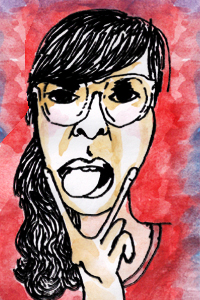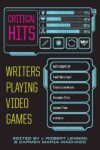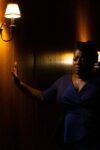
Larissa Pham is an artist and writer living in Brooklyn. She co-edits the blog at Full Stop, where she writes a monthly column about feelings and the Internet, and she welcomes any better, more poetic wordings of that sentiment.
Last Thursday I roasted a whole chicken for the first time. After wrestling with all the bloody bags it came in I rinsed it in cold water till it ran clear, gingerly put my hand inside to feel for any giblets (there weren’t), and seasoned it with sea salt, atop a raft of raw potatoes and CSA veggies. I was referencing an online recipe (Google search: easy roast chicken) and I got olive oil all over my trackpad. The chicken turned out beautifully: juicy and golden with a salt-crackly skin. I took a photo of my handiwork and sent it to my mother, because I wanted her to be proud of me.
I work a day job now, a real job with health insurance and a 401k. I get up in the morning just before sunrise and I shower and dress in business casual and apply liquid liner scrupulously. I read a novel on the A train and I go to an office where I have a desk with two monitors and all day long I feel like a fraud, like a little girl trying on grown-up clothes. There is one box in my room that still needs unpacking: it is full of photography supplies from my days as an art student. I still need to get curtains.
I’m not sure that there’s any way to move to New York and not feel plopped in a narrative outside of your own making. I would say the same regarding getting older. The novel I am reading now on my commute is The Love Affairs of Nathaniel P, and yes I know I’m a year late on it but my excuse for avoiding it is that an ex of mine said that he identified with Nate and I was terribly distraught at that idea, and I am possibly even more distraught now that I’m almost done with the book. Anyway, it is impossible to read a book set in New York City while in your first year in the city and not feel like some giant joke, every charade of literary Brooklyn rolled into a farce wearing a blazer that is work appropriate, or at least not purchased from Forever 21. I am, also, twenty-one. Almost twenty-two.
How do you grow? How do you know who to be, how to act, how to dress, how to turn the pages of your book on the subway when you only have one free hand? A few points of reference: my mother, her mother, Joan Didion, certain chapters in The Goldfinch, the entirety of The Hours by Michael Cunningham. If it seems I am conflating domesticity and New York, I am; they are two new things I have only understood by example, through narrative referent, and I crave them.
I spent much of the past four years of my life in a state I’ll term emotional precarity. I was wild and fun. I was happy sometimes; I was sad very often, and I went to sex parties. I enjoyed writing about various pleasures and pains; it was the variability of them that made them interesting. By extension, I assumed, that wildness was the interesting thing about me. What are we without our stories?
Domesticity and the city seem to be two sparkling pillars of myth. They’re not lies; they are built of the salt of real things. Now that we have grown old and farther from our wild ways, my friends’ Instagram feeds are less blurred party photographs and increasingly, beautiful home-cooked meals and pictures of dogs, apartments, houses. I spend far too much time on interior design blogs, my mouth watering at clean hardwood floors. When I first moved here, I went to Crate and Barrel, which is not in my budget, just to touch some nice furniture. Last weekend my boyfriend and I went to the MUJI near Astor Place and, suddenly very tired, we lay on top of the sample bedding holding hands. The comforter was very soft and striped and stuffed with down. Domesticity has become desirable in precisely the ways it used to bore me. It is as though once I tired of wildness I sought the next newly exotic thing; this was stability, the shouldering of fiscal responsibility, and vague aspirations of climbing to a higher social class.
Emotional precarity — the wildness, the effervescent joy and crushing despair and uncertainty that chart the emotional landscape of most young people — is appealing for some time. It is interesting. It is readable to some degree, should you be the writing kind. It is very formative. It is also easy. Stability is a hard thing to find. Once one is aware of a scarcity it becomes trendy. This effect is amplified as one observes everyone else doing the thing on social media. All of a sudden one clamors to be a homemaker, to get her shit together, to roast a chicken and prove herself (here the waters trouble) a woman. We are adults. We drink wine and watch Netflix. I am watching all my close friends move away and grow old; I say old with some humor here as the greyest of us is not yet thirty.
I love reading descriptions of people’s apartments in New York fiction. That is because now I too have a New York apartment and I would like to compare it to the idea of what a New York apartment might be. I feel similarly about descriptions of parties. I am a writer, so I am a narcissist; I admit this. The urge to narrativize one’s life is close to what I am trying to describe, but I think what I mean is living one’s life as though one will later write a story about it. All of the actions just so. The book open in one’s lap. At the moment I am observing that story change.
As much as I newly crave it there is something a little dark and ugly at the root of the American dream of domesticity. I witness my complacency. I want nice things; this want is something that I did not engineer on my own, but was selected for me. Our wants are manufactured by what we consume, in the hope we might consume more of it; we are complicit in what we choose to desire. Sometimes this is dangerous. Sometimes it is a roast chicken, exposed brick, hardwood floors, but that is married to other specters: the perfect partnership, subordination to classic womanhood, and the want for money, always more money.
Domesticity is a dream of something alongside the reality of it; the danger of it is that I have the ability to alter both my reality and the dream and one goes untouched. It is the dream, because it is hard to tamper with dreams. I have grown out of an era of wildness and into an equally bewitching trap, the cult of domesticity, which serves no one and props up heteronormativity, capitalism, and commodity. Now it remains to be seen if I acquiesce to my complicity. I try not to. I called myself a radical when I was in school.
As for the dream of New York and all its figments, I still have stars in my eyes. But on this let me be weak.
This post may contain affiliate links.







